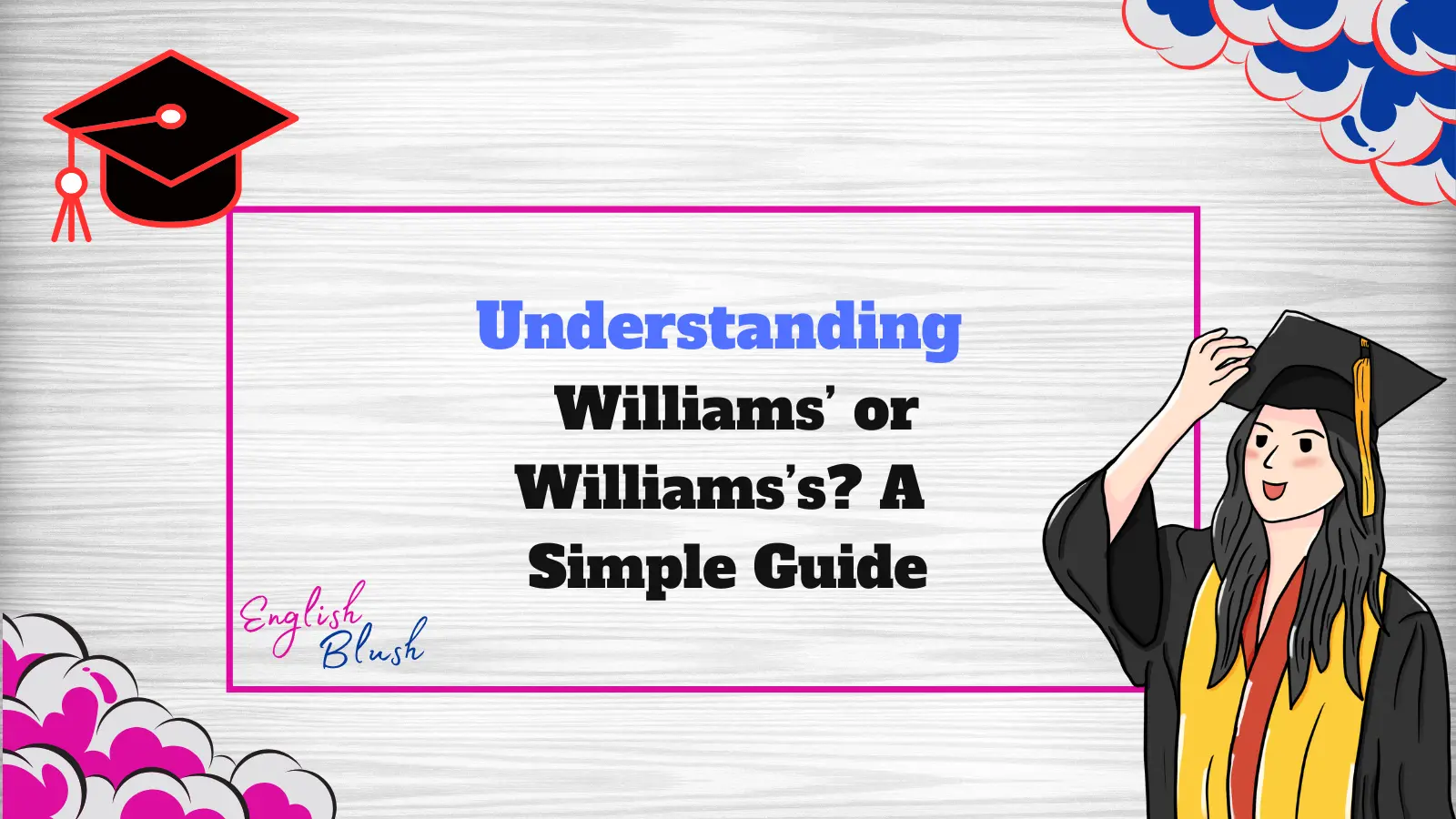In English, we use the words Williams’ and Williams’s to show possession. This means we’re talking about something that belongs to someone named Williams. You may have seen the apostrophe in both forms, but which one should you use? Let’s break it down simply.
What is Possession in English?
Possession shows that something belongs to someone or something. For example:
- The dog’s bone (the bone belongs to the dog)
- The teacher’s book (the book belongs to the teacher)
When the owner’s name ends in an “s”, like Williams, it gets a little tricky. So, let’s look at the different forms.
Singular Possessive: Williams’ vs Williams’s
A singular possessive shows that one person owns something. With names ending in “s” (like Williams), both Williams’ and Williams’s are correct, but there are small differences.
Williams’
This form is more common in American English when a name ends in s. We add an apostrophe after the s to show possession.
For example:
- Williams’ car means the car belongs to Mr. Williams.
- Williams’ hat means the hat belongs to Mr. Williams.
Williams’s
This form is used less often, but it is still correct. In Williams’s, we add an apostrophe and another “s” to show possession. This form is often used in British English. For example:
- Williams’s notebook means the notebook belongs to Mr. Williams.
- Williams’s shoes means the shoes belong to Mr. Williams.
Here’s a quick comparison of Williams’ and Williams’s in the singular possessive form:
| Form | Meaning | Example |
|---|---|---|
| Williams’ | Possession (used more in American English) | Williams’ car (the car belongs to Mr. Williams) |
| Williams’s | Possession (used more in British English) | Williams’s hat (the hat belongs to Mr. Williams) |
Plural Possessive: Williamses’
Now, what if you’re talking about more than one Williams? This is where we change things a bit.
To show possession with plural names, we first make the name plural and then add an apostrophe at the end.
Williamses’
When we talk about more than one person named Williams, we add -es at the end of Williams to make it plural, and then add an apostrophe after the s to show possession.
For example:
- Williamses’ family means the family of all the Williams people.
- Williamses’ house means the house belongs to a group of Williams.
Here’s a quick look at the plural possessive form:
| Form | Meaning | Example |
|---|---|---|
| Williamses’ | Possession of a group of people named Williams | Williamses’ home (the home belongs to the Williams family) |
Plural Form: Williamses
What about just talking about multiple Williams without possession? That’s when we change to Williamses.
For instance:
- There are many Williamses in the class. (Talking about multiple people named Williams)
So Williamses shows more than one person, but doesn’t show possession.
| Form | Meaning | Example |
|---|---|---|
| Williamses | More than one person named Williams | There are many Williamses at the party. |
Summary
Here’s a quick recap of the different forms and when to use them:
| Form | Meaning | When to Use It |
|---|---|---|
| Williams’ | Singular possessive (American English) | When something belongs to one person named Williams (e.g., Williams’ car) |
| Williams’s | Singular possessive (British English) | When something belongs to one person named Williams (e.g., Williams’s book) |
| Williamses’ | Plural possessive | When something belongs to a group of people named Williams (e.g., Williamses’ house) |
| Williamses | Plural form of Williams | Talking about more than one person named Williams (e.g., There are many Williamses) |
Conclusion
Choosing between Williams’ and Williams’s can feel tricky, but remember that both can be correct for showing possession. The choice between Williams’ and Williams’s comes down to your style and which English variant you follow.
If you’re unsure, go with Williams’, which is widely accepted. If you’re in British English or want to follow a more traditional approach, use Williams’s.
By knowing when and how to use these forms, you can make your writing clear and correct!





